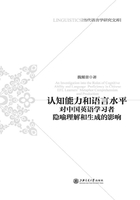
2.3.2 Relationship of cognition and metaphor in cognitive linguistics
Cognition is etymologically originated from the Latin word cognitio meaning the action or faculty of knowing or learning, which is one of the three important domains in psychology research (Zhao 2002:1).With the rise and development of cognitive science, the nature of the term seems to appeal to more researchers. Cognition in cognitive sciences is generally defined as the exercise of human intelligence, and it is believed to be essential to everything we do(Osherson 2000:xi).Specifically, it is a mental process or mental construction connected with understanding, formulation of beliefs, and acquisition of knowledge as well as expression for intention and attitude to knowledge, etc.(Sjostrom 1998:72;Ortony 1998:1; Kittay 1989:9).Cognitive linguistics, as a branch of cognitive sciences, assumes that“in the relationship between language and the physical or obj ective world there exists an intermediate level‘cognition’”(Lan 2003:22; Svorou 1994:4). Thus, language is viewed as an integral part of human cognition (Langacker 1987:12).Therefore, language study is an essential part of the study of human cognition and metaphor study constitutes an essential part of cognitive linguistics.And more importantly, as far as linguistics is concerned, an account of linguistic structure should articulate with what is known about cognitive processing in general(Langacker 1987:12).Since, in cognitive linguistics, metaphor is primarily viewed as a human cognitive mechanism, and since communication is based on metaphor, language is considered as linguistic realizations of metaphor and thus an important source of evidence for what metaphor is like.Therefore, the importance of metaphor to language and cognition cannot be over emphasized(Yu 1998:1). The importance of metaphor study to cognitive linguistics is as metaphor to language and cognition.Just as what Hamilton(2004:104)points out, “It is fair to ask where cognitive linguistics would be today without metaphor.Without its enquiry into metaphor, this relatively young branch of linguistics might have been slower to transform the tree to which it belongs, then now seems evident”.